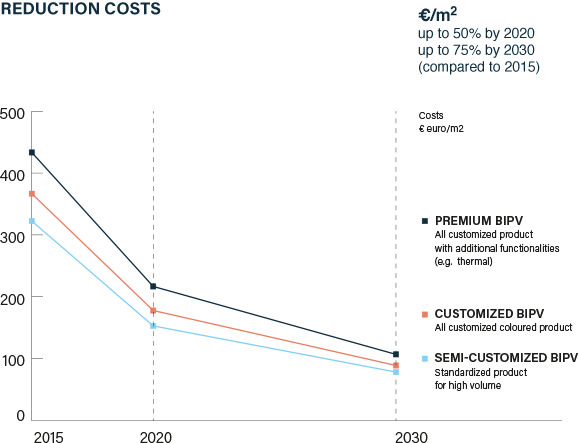Our mission
The European Union has set ambitious climate and energy goals within the implementation plan of the COP21 framework and 20/20/20 Targets. To contribute to this energy turnaround, Building-Integrated Photovoltaics (BIPV) will undoubtedly play an important role especially in cities and urban areas. The widespread deployment of BIPV could potentially lead to an increase in the area available for harvesting solar energy in densely populated countries, with an estimated 22% potential in Europe for global electricity share.
Integrating solar panels into building façades and roofs enable the substitution of traditional building materials with high quality architectural designs contributing to reduce CO2 emissions.
The project is expected to contribute to the implementation of Zero-Energy Building policies. Achieving a substantial reduction to BIPV costs in the building sector provides an opportunity for the European industry to differentiate its products from standardised or otherwise, low value PV modules. It is necessary for EU manufacturers to develop Energy Positive Glazing in providing premium value solutions to the construction sector and to enable Nearly Zero-Energy Buildings.
In order to develop sustainable solutions to decrease the cost of BIPV and allow for significant market growth, the Be-Smart project is pursuing the following objectives:
Be-Smart will support EU industrialisation
Be-Smart will support the industrialisation of new materials and processes in the manufacturing of multi-functional BIPV elements. Implementing the newest “transformative approach” strategies, such as revolutionary white or coloured PV elements based on ubiquitous c-Si solar cells, is its focus. Leaner and more automated manufacturing processes will allow easier visual modification integration of the elements.
Be-Smart will demonstrate cost reduction
industrial manufacturing processes, including up- and down-stream operations along the value chain, will allow for a cost reduction of up to 50% by 2020 and up to 75% by 2030 (compared to 2015).
Be-Smart will propose new roadmaps
A roadmap will be prepared and proposed for each stakeholder in the value chain.
Be-Smart will position BIPV as a construction material
Energy Positive Glazing (EPoG) concept will be implemented to replace the current BIPV word currently perceived as PV products dominated by low cost Asian manufacturers.
Be-Smart will substantiate the results of the project
through real case demonstrators, and assess technological, environmental, social and economic impacts and benefits across the entire value chain using a life cycle assessment approach and exploitation plan.
Our vision
Building-Integrated Photovoltaics (BIPV) enable the substitution of traditional building materials with high quality architectural designs contributing to reduce CO2 emissions.
BIPV will contribute to significant clean electricity generation in line with EU policy, as well as to the reestablishment of a stronger European industrial sector in the solar energy field. Presently, BIPV use has primarily been limited to symbolic façade and roof demonstration projects, often with standard modules added to the surface of existing buildings.
This project will help remove barriers that have previously held back BIPV implementation by supporting the industrialisation of new multi-functional BIPV elements and focusing on cost effective, break-through transformative approaches to achieve aesthetic modules.

